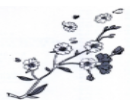Date: 2021-06-25
M&L Laboratories Inc. (“M&L”) is an internationally renowned multinational company that produces fragrances, face and body care products under the L’Occitane brand. Since 2008, the L’Occitane Cherry Blossom body lotions and shower gels were sold China and have become main products of the L'Occitane brand. In 2016, M&L registered the cherry blossom graphic trade mark (Trade Mark No. 17800581). In 2019, M&L noticed that the operator of "andorheal flagship store" on an e-commerce platform, Jiang Junda Biotechnology Development Co. (“Junda”), sold a product called Cherry Blossom Body Lotion. The shape of the bottle, the cherry blossom pattern on the bottle and the design of the bottle opening are highly similar to the L'Occitane Cherry Blossom Body Lotion. The manufacturer of the allegedly infringing goods is Guangzhou Ailian Cosmetics Co., Ltd. (“Ailian”).
The Hangzhou First Intermediate Court held that the acts constituted as trade mark infringement and unfair competition and Junda and Ailian to compensate L’Occitane RMB 3 million and RMB 6 million respectively. The two companies later appealed to the Zhejiang High Court.
The Zhejiang High Court held that there was trade mark infringement and unfair competition. Regarding the amount of compensation, the two companies did not have evidence to prove that the sales of the online store were generated from fake transactions, so the amount of compensation determined by the court of first instance was correct. Moreover, the two companies knew that L'Occitane Cherry Blossom product series had a high reputation, but they they still maliciously attached goodwill on the L’Occitane trade marks and product packaging. The product descriptions on the infringing product pages are also similar to the L’Occitane Cherry Blossom product pages, and even refer to "data sources in L’Occitane”. Even after the lawsuit was filed, the infringements did not stop, setting out the maliciousness of the infringement and causing further damage. In the end, the first instance judgment was upheld.

Source: http://www.iprchn.com/cipnews/news_content.aspx?newsId=129794
Date: 2021-06-18
Tencent brought an unfair competition action against Shenzhen Palm Vision Technology Co., Ltd. (“Palm Vision”). It believed that the "WeChat automatic red envelope grabbing" software (the software in dispute) developed by Palm Vision, which allowed users to “grab” red envelopes on WeChat without opening the app itself, took advantage of WeChat's red envelopes and destroys the fairness and entertainment of the “game”.
The Beijing Intellectual Property Court held that the software improperly used the operating resources and competitive advantages of WeChat to attract WeChat users to download the software and attract traffic for their own advertisements, undermining the competitive feature and disrupting the market order in the online environment. In addition, the software used technical means to achieve automatic red envelope grabbing by simulating a click on the screen, which directly changed the normal operation process of WeChat's red envelope function through technical means and replaced manual red envelope grabbing with automatic red envelope grabbing, damaging WeChat's user experience. Ordinary users who did not use the accused software may be dissatisfied with WeChat's service, thus damaging WeChat's goodwill.
The Beijing Intellectual Property Court held that the defendant had violated the principle of good faith and business ethics by using technical means to prevent and disrupt the normal operation of the "red envelope grabbing" function legally provided by the WeChat software operator, constituting as unfair competition. Therefore, Palm Vision was ordered to compensate Tencent for economic losses of RMB 4.754 million.
Source: http://ip.people.com.cn/n1/2021/0618/c136655-32134249.html
Date: 2020-11-02
On November 2, 2020, the Beijing Intellectual Property Office released a case of copyright ownership and infringement dispute between Polycom and Xiaoyu Company. The case was also selected as one of the "Top 10 Technology Innovation Cases" of the Beijing Intellectual Property Court issued on April 26, 2021.
The plaintiff, Polycom, discovered that Xiaoyu Company’s three software models, namely Xiaoyi Easylink Windows Client, Xiaoyi Easylink Android Client and Xiaoyi Easylink ME80 Machine Terminal, copied its RPD3.3 software and RPM3.3 software in terms of software architecture, network transmission protocol, programming interface, call session module, software function name and software code. It filed a lawsuit before the Beijing Intellectual Property Court against Xiaoyu Company for infringing its copyright, modification, distribution and information network dissemination rights.
The Beijing Intellectual Property Court held in the first instance that Xiaoyu Home Company and Xiaoyu Yilian company jointly developed and produced the Xiaoyu Easylink Android client. Part of the code of the software was the same or similar to that of Polycom’s RPM3.3 software, which included both the copying of RPM3.3 software and the modification of RPM3.3 software, thus infringing on Polycom’s right to modify and copy the software. At the same time, Xiaoyu Company also offered Xiaoyu Easylink Android Client to the public through its official website "www.xylink.com". This behavior violated Polycom’s information network dissemination rights for the software.
The final judgment: Xiaoyu Company was to compensate Polycom for economic losses of RMB 500,000 and reasonable expenses of RMB 450,000, Xiaoyu Home Company to compensate for the economic losses of RMB 350,000, and Xiaoyu Company and Xiaoyu Home Company to be jointly and severally liable to compensate reasonable expenses of RMB 300,000.